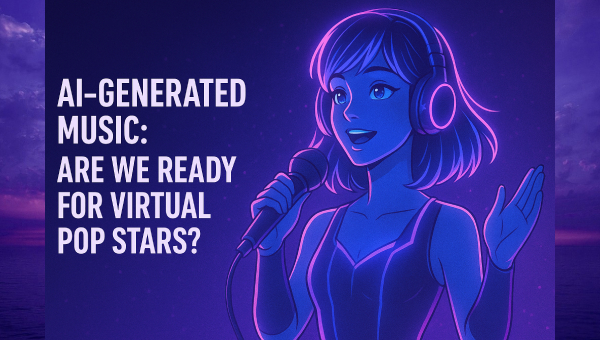AI-Generated Music: Are We Ready for Virtual Pop Stars?

Artificial intelligence (AI) has been transforming the creative industries at an astonishing rate. Whether in the visual arts or literature, it is now making inroads into the area of music a sphere traditionally dominated by bare human emotion and cultural expression. However, today AI-composed music is not a vision of the future. It is already present. With the algorithms being taught to create melodies, write lyrics, and even sound like the most famous singers, there is one thing that we need to ask ourselves: Are we prepared to have virtual pop stars?
The way AI Is Transforming the Sound of Music
The role of AI in music was initially rather small - instruments to help human artists compose, arrange, and produce music. Several sites, such as Amper Music, Aiva, and MuseNet by OpenAI, enabled musicians to play around with machine-composed music, frequently seeing it as an aide but not a substitute. These tools became more intelligent with time, learning musical form, emotional mood, and genre.
AI can now do much more. It is able to write entire symphonies in the Beethoven or Drake style, create artificial voices that are indistinguishable from those of real people, and even create virtual avatars that have their own personality and fan base. Years of musical training used to be necessary to achieve what can now be done by a machine in seconds. Such a fast development raises the question of taking a closer examine what AI-created music is all about, exactly, and whether people are ready to accept artificial musicians.
What Is AI Music?
AI music refers to music where either all or some parts of it have been composed by algorithm. They are founded on deep learning models, which are trained on massive music libraries, and therefore, they can capture the patterns and styles, that can be characteristic of particular artists, musical genres, or even moods. AI can generate instrumentals, lyrics, vocalizations, and even live-like visual performances at the press of a button, depending on the program.
There are AI models that are explicitly taught to replicate the styles of dead artists, which for some is both amazing and controversial. The others are concerned with the combination of styles to produce completely new sounds. Such instruments of vocal synthesis as Hatsune Miku (a well-known virtual singer in Japan) or Synthesizer V allow digital characters to come to life and thus be able to take to the live stage through holographic projections.
Virtual Pop Stars: Reality or Tomorrow?
It might seem like the storyline of a science fiction movie, however, reality has kept pace with the thought of a virtual pop star. Hatsune Miku is a blue-haired Vocaloid character produced by Crypton Future Media and she has already sold out concert venues worldwide. She is not human, does not age, and can never miss a note.
After her success, other virtual influencers and musicians started picking up. The digital Instagram model and singer Lil Miquela has partnered with real artists, modeled for high fashion brands, and put out original music- even though she is not a real person.
This trend will increase. Companies are spending fortunes to develop realistic avatars that would be able to perform in metaverse concerts, interact with fans on social media, and generate music tailored to audiences. The logic is obvious, virtual stars do not need sleep, food, or paychecks. They can tour around the clock and change their brand image in real time depending on the market trends.
Advantages of AI in Music Generation
The advantages of AI Music Creation include the following:
- AI Levels the Playing Field for Creators: AI liberalizes music production. Untrained musicians with no connections to recording spaces can now produce good music with the help of AI. This gives opportunities to people of underrepresented groups to join the music industry.
- Efficient and Cost-effective: Conventional music production requires many partners- composers, producers, sound engineers, and singers. AI decreases this chain. Small labels and startups are able to reduce their expenses and yet provide high-quality content.
- Personalization to Listeners: AI can make music personalized. Consider playlists that change their emotional timbre on the fly depending on how you are feeling or AI-generated artists writing theme songs specifically meant to appeal to individual fans. This form of user creativity has never existed before.
- Creative Collaboration: AI is a creative collaborator to many musicians. It may propose chord progressions, assist in getting through writer's block, and even provoke new artistic directions. This blend of human and artificial intelligence may bring breakthroughs in music.
- The Ethical Dilemma in Music: Though, there are also a few red flags that come with the emergence of AI-generated music.
- Death of Human Touch: People claim that music is intrinsic to humans, created through experience, strife, happiness, and pain. Will a machine that has never lived, never experienced emotions, never felt capture the soul of a song? AI can mimic feelings but cannot feel. The critics are afraid that it will result in music that is technically excellent and musically empty.
- Copyright and Ownership: AI acquires my rhythm and melody sense through listening and learning the already existing tracks. When an AI-generated song sounds too much like a Taylor Swift ballad or a Kanye West beat, who do the rights belong to? Laws are lagging behind and borders between inspiration and plagiarism are getting more obscure.
- Job Displacement: With AI assuming the roles of producers, composers, and even singers, the creative industry faces the imminent danger of job losses. Like with the automation that upset factory work, AI has the potential to redefine the music industry labor force and leave a large number of people behind.
- The Music Imitation Game: The AI can now mimic the voice of a singer to a nearly flawless level. That creates a risk of abuse- unreleased tracks, false collaborations, or posthumous albums that the artist never authorized or his or her estate.
Reception by the Audience: Are We Prepared?
Surprisingly enough, the overall population has been anxious and intrigued by the idea of AI-generated music. AI-generated music tends to become viral because of the novelty effect but does not tend to garner long-term emotional appeal. Authenticity and connection are the things that fans still desperately want- and machines cannot truly deliver.
With that being said, the younger generations, being digital natives who are used to TikTok trends and virtual influencers, might be more willing to accept virtual artists. The distinction between human and artificial might be not as important to them as the quality of the music and its atmosphere.
Another quality that virtual pop stars have and human celebrities do not is the degree of interactivity. Fans may co-create with the AI, commission custom performances, and even affect the backstory or appearance of the character- generating a feeling of ownership and intimacy that may not be recreated by traditional artists.
Hybrid Creativity? The Future of Music?
The future may not concern AI taking over musicians but complementing them. It helps to consider AI as an instrument, such as a guitar or synthesizer, and not a rival. Musicians such as Grimes, Holly Herndon, and Taryn Southern have already adopted the AI as a partner, rather than a danger. They employ AI to innovate and extend the creative limitations and soundscapes.
Then again, the music industry can reach a compromise: hybrid bands including human and virtual band members, songs written by AI and performed by actual artists, and holographic concerts merging both worlds. It may not be a binary future of music, it may be a gloriously mixed one.
The bigger question: What do we appreciate in Music?
This debate is full of a more fundamental philosophical query: What do we appreciate in music? Is it the tune and beat- or the tale behind the musician? Is it heart appeal--or mechanical excellence?
AI can mimic style and accuracy, even pretend to be emotional. But will it be able to write a song like Adele following a breakup? Is it capable of providing the unrefined agony of a Billie Eilish song or the elation of a Beyonce empowerment song? Not yet. And perhaps not at all.
In the current situation, AI can be regarded as an extremely potent tool, a muse, but not a creator. However, as technology keeps on advancing, the lines will continue to blur.
Conclusion
Virtual pop stars and AI-composed music are not science fiction but present-day reality. The music industry is at a crossroads with technology presenting boundless opportunities and challenges never seen before. The way that music is created, distributed, and consumed is changing.
But the result of this in terms of either cultural renaissance or creative destruction is in the hands of us, the listeners, artists, and leaders of the industry in terms of how we approach this new frontier. Virtual pop stars might not be exactly what the world is ready to accept, yet they are at the threshold of the mainstream. The question is not whether they will come in but how we will receive them.
Must Read This: Love in Every Note: The Perfect Valentine’s Day Playlist








